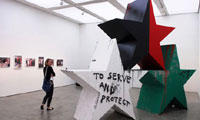 ICA warns staff it could close by May
ICA warns staff it could close by MayInstitute could fall victim to recession with costs needing a £1m trim
The ICA has been at the forefront of the contemporary art movement, with bold, political shows such as the Memorial To The Iraq War Exhibition in May 2007 Photograph: Ray Tang/Rex Features/Ray Tang / Rex Features
In the Institute of Contemporary Arts in London there is a bloodstain on an office wall. This Is Norman's Blood, reads the label – the traces of a fistfight between former ICA curator Sir Norman Rosenthal and actor Keith Allen.
More blood, of the metaphorical variety, is soon to be shed at the institute. Staff members have been told that a financial deficit currently at around £600,000 might rise to £1.2m and if radical steps are not taken the ICA could be closed by May.
Minutes of a sometimes bad-tempered staff meeting held last month have been seen by the Guardian. The meeting was also attended by Alan Yentob, the BBC creative director, and Tessa Ross, Channel 4's head of film and drama, both of whom sit on the ICA's council.
The meeting saw ICA director Ekow Eshun explain that a staff bill of £2.5m will have to be reduced by £1m for the organisation to survive. Without a wholesale restructuring, he argued, the ICA could be the first major British cultural organisation to fall victim to the recession.
The ICA's management is now consulting on staff redundancies, with the process due to be completed by the end of March.
Since its early beginnings just after the war, when the ICA was one of the few institutions to introduce avant garde art to Britain, the organisation has played a significant role in the UK's cultural and intellectual life. But critics believe that it has lost its sense of purpose, particularly when contemporary art is now well represented in London's museums and galleries.
The financial problems emerged, Eshun told the Guardian yesterday, as a result of "a perfect storm of events that all came together".
A fundraising auction of works donated by artists including Damien Hirst in October 2008 failed to raise its estimated £1.3m, instead realising about £673,300.
Over the 2008-9 financial year, the ICA raised only £200,000, or half the projected revenue, from hiring out its premises on The Mall in London for commercial use, a problem put down to the recession.
Eshun said that other traditional streams of income, such as the bookshop and the ICA film distribution arm, also suffered because of the recession.
The ICA has been granted a package of £1.2m over two years by Arts Council England's (ACE) Sustain fund, which is designed to help arts organisations hit by the recession. The total turnover of the ICA is £4.5m, and it receives an annual ACE grant of £1.3m.
But Eshun said the problems at the ICA ran deeper than the current financial climate, and in May last year, even before the scale of the immediate financial problems had emerged, a consultancy firm was commissioned to report on structural problems within the organisation.
Yentob told the Guardian: "We've been managing a programme with a large staff running numerous individual projects. When trouble emerged and financial problems surfaced because of the recession it was as if we had been ambushed from every side."
Instead of several, often competing departments devoted to exhibitions, talks, or films and so on, three larger teams – one devoted to the artistic programme, one to finance and operations, and one to communications – will be created to "deliver a more integrated programme", said Eshun. He said that the organisation's renewed vision would "address the big questions and lead debate and enquiry into culture and the arts ... We are here to bring together artists and audiences to ask questions about who we are and how we live."
The minutes of the meeting seen by the Guardian, compiled informally by staff, report that one attender said he "didn't want to hear the word 'vision' coming from Ekow Eshun again – he had heard it at every staff meeting this year and it meant nothing to him".
Eshun, who has been director of the ICA since 2005, said that he did take "responsibility for the ICA's present and future over the time that I've been here. But it has been going for 60 years. Trying to turn it round isn't straightforward."
According to Yentob: "The ICA council acted nearly a year ago in consultation with the Arts Council, in commissioning the organisational review. Perhaps it could have happened even earlier, but this is a big step with serious
The ICA was founded in 1947 by the critic Herbert Read, along with artists including the surrealist painter Roland Penrose and sculptor Eduardo Paolozzi. It mounted early shows of pop art and abstract painting, and provided a meeting place for radical artists. It continued at the cutting edge with events such as Mary Kelly's infamous "nappy show", an exhibition in 1976 officially called Post Partum Document, which included her baby's dirty nappies. The same year it was among the first venues to host a gig by the Clash. In the 1990s it played host to the first British showings of work by the sculptors Miroslaw Balka and the late Juan Muñoz, both of whom later created installations for Tate Modern's turbine hall. Staff alumni include Sir Norman Rosenthal, the retired exhibitions secretary of the Royal Academy of Arts; Sandy Nairne, the director of the National Portrait Gallery; and Iwona Blazwick, the director of the Whitechapel Gallery.
 ICA warns staff it could close by May
ICA warns staff it could close by May